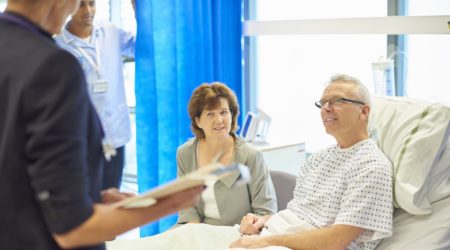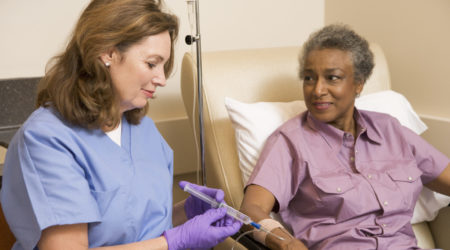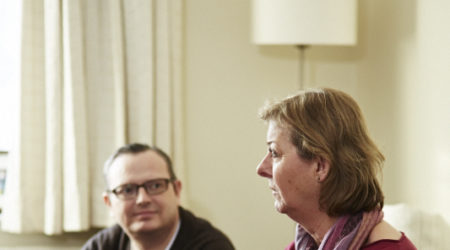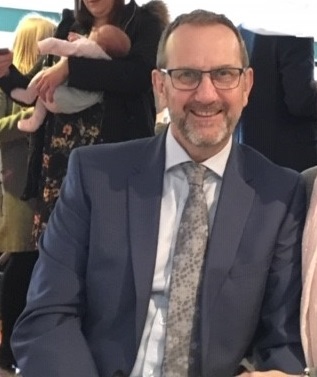
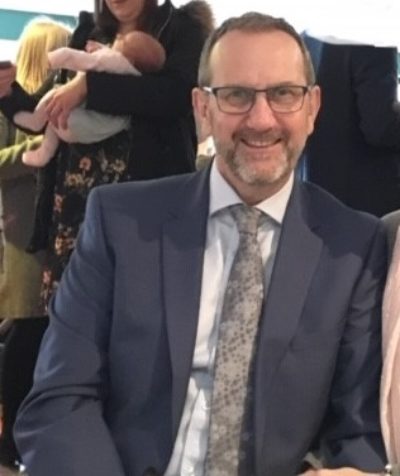
Geoff
Geoff shares his experience after being diagnosed with Ampullary adenocarcinoma in 2018
Throughout 2017, I was suffering increasing symptoms of indigestion, stomach upset, being bloated and diarrhoea. I associated this with what I was eating as some food made things worse. I visited my doctor and we decided I should go for an endoscopy in the November 2017 to determine the cause. It transpired I had a hiatus hernia, but whilst examining me they noticed some ‘anomalies’ in the lower part of my stomach towards my duodenum and took biopsies. The results came back negative and I was put on a course of Lansoprazole (antacids) which initially helped considerably.
Over Christmas 2017, my condition got worse and in January 2018 I went back to the doctors as my diet was becoming more restricted and I was losing weight, which I largely put down to eating much less. Another endoscopy was arranged with a specialist this time. This took place in early March 2018, but by now I had lost three stone and could only manage to eat porridge with confidence.
Just before the endoscopy I became jaundiced, and my bowel movements were black. The endoscopy once again showed no more than before, including anomalies, and biopsies were taken again. I went back to my doctor two days later and a liver test was arranged. The following day I received a phone call in the evening saying I must report to my local hospital immediately for examination and tests: I packed and left not really knowing what to expect.
The surgeon believed I had pancreatic cancer
I had many tests: endoscopy, bloods (many, many bloods!), CT scans, ultrasound, MRI. It was concluded that I appeared to have a ‘block’ or ‘stone’ in my bile duct as far as they could see – but this was inconclusive, so I was referred to a specialist hospital.
A week passed and Tuesday 10 April 2018 I was seen by the surgeon. I was accompanied by my wife, and he gave me his diagnosis and prognosis after examining all the evidence and results to date. As I said my results were inconclusive. I was offered the opportunity to have further tests to have some concrete evidence, but the surgeon believed, on the balance of probabilities and specialist experience, that I had pancreatic cancer and was proposing I had urgent and surgery to remove the tumour. At that stage, pre-operative, I could only be diagnosed with a ‘likely periampullary tumour’: post-surgery I was indeed diagnosed with ‘ampullary adenocarcinoma’…he was absolutely right…and so was the decision to operate.
That day my life changed forever and would never be the same again.
I was scheduled for Whipple’s procedure
I was then bombarded really, with all the policy, procedure, percentages of probability and consent information which I don’t believe you can really digest at the time. I had just been told that it was highly likely that I had cancer and they needed to act quickly. I left with a stack of information and lots of people I could contact for clarification, ask questions, clear my head etc.
I went back to work immediately after the consultation and consent to surgery, desperately wanting things to be normal and feel I had some control over my life. The surgeon was excellent and insisted that he meet all my family and brief them, which was invaluable.
I was scheduled for Whipple’s procedure Monday 23 April, and it would be a long operation. I had settled all my family affairs, somehow, I went into professional mode and just got it done. The hardest part was having all the family together and trying to reassure them all would be fine…which of course it was, but at the time I wasn’t sure. Prior to surgery I set myself some goals; wake up – you’ve survived! Check and see if they operated – they had…now concentrate on each stage of recovery.
Recovering from the operation and starting chemotherapy
Recovery was long and slow for me, and I had significant periods of pain and discomfort, in what seemed a very slow process. I lost significantly more weight, had difficultly eating, and was discharged with a surgical drain as I still had some problems at the site of the surgery.
12 weeks later, it had all healed, and I was recommended for a course of chemotherapy for six months. I had both Capecitabine (tablets) and Gemcitabine (intravenous), as part of a clinical trial: three weeks on, one week off.
The realisation of what I was going through suddenly hit me
These were dark days as I had temperature spikes and on more than one occasion, readmission into hospital. The first round passed like a breeze but then I became very anxious as the treatments went on and was referred to a counsellor, who helped me greatly. I think it was the realisation of what had just happened and what I was going through that suddenly hit me.
I often felt sick, but wasn’t sick, my hair thinned, my hands and feet became very sore, but manageable with some magic emollient they gave me. My appetite was appalling! I had lost over 5 stone at my lowest point.
2 years on
2 years on and I am well! I have good and bad days as far as energy goes; some days I can’t seem to find the energy at all, other days I can do lots! I regained some significant weight and have maintained it. My oncologist is always thrilled if I put on weight! With the Creon tablets I can eat a good variety of foods, although I am constantly reminded that the ‘plumbing’ is no longer the same….so I get what is known as ‘Whipple attacks’, usually it feels like a spasm and the site of the surgery can still be tender some days. I am currently under a dietitian to see if they can stabilise my stomach and bowel…it’s a work in progress!
Emotionally, I fully appreciate how lucky I’ve been, and the experience has changed me for the better. I have found these real-life stories a great help to me, knowing what may be next and learning from those who’ve gone through this experience!
July 2020
